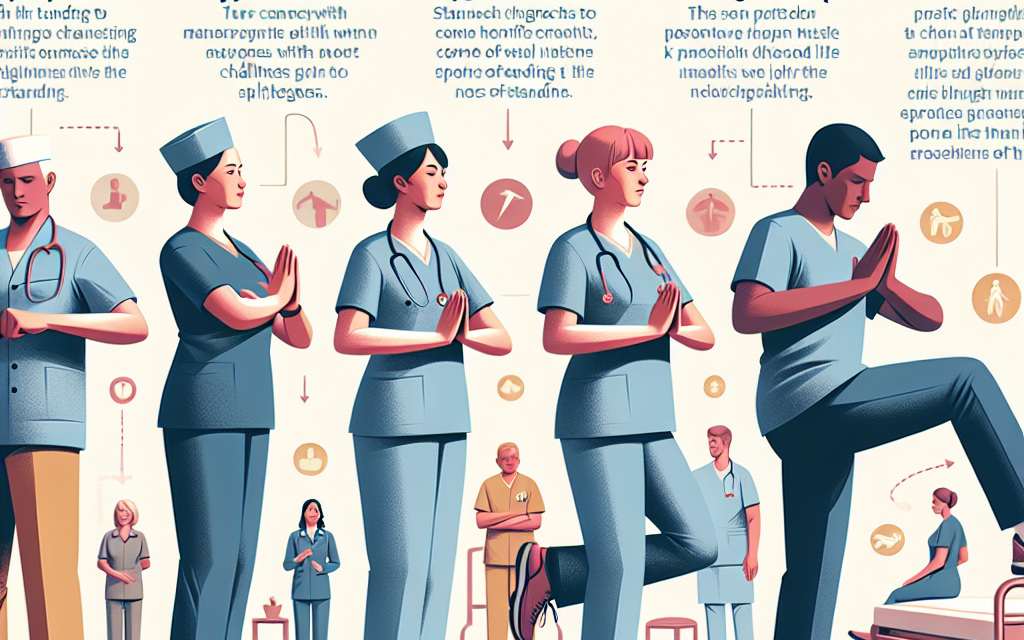Effective Coping Techniques for Nurses to Manage the Challenges of Extended Standing
Nursing is a demanding profession that often requires long hours of standing, which can lead to various physical and mental health challenges. Extended standing can result in fatigue, musculoskeletal disorders, and emotional stress. Therefore, it is crucial for nurses to adopt effective coping techniques to manage these challenges. This article explores various strategies that nurses can implement to alleviate the physical and psychological burdens associated with prolonged standing.
Understanding the Physical Impact of Extended Standing
Extended periods of standing can have significant physical repercussions for nurses. The human body is not designed to remain in a static position for long durations, and this can lead to various health issues.
- Musculoskeletal Disorders: Prolonged standing can lead to musculoskeletal disorders, particularly in the lower back, legs, and feet. According to the American Association of Occupational Health Nurses, nurses are at a higher risk for developing conditions such as plantar fasciitis, varicose veins, and chronic lower back pain.
- Fatigue: Standing for long periods can lead to physical fatigue, which can affect a nurse’s ability to perform their duties effectively. A study published in the Journal of Nursing Management found that fatigue is a common complaint among nurses, often leading to decreased job satisfaction and increased turnover rates.
- Circulatory Issues: Extended standing can impede blood circulation, leading to swelling in the legs and feet. This condition, known as edema, can be uncomfortable and may require medical attention if not managed properly.
Understanding these physical impacts is the first step in developing effective coping strategies. Nurses must be proactive in addressing these issues to maintain their health and well-being.
Ergonomic Practices to Reduce Physical Strain
Implementing ergonomic practices is essential for nurses who spend long hours on their feet. Ergonomics focuses on designing workspaces and tasks to fit the worker’s needs, thereby reducing strain and injury.
- Proper Footwear: Wearing supportive shoes is crucial for nurses. Shoes with good arch support and cushioning can significantly reduce the impact of standing on hard surfaces. A study published in the Journal of Occupational Health found that nurses who wore appropriate footwear reported less foot pain and fatigue.
- Use of Anti-Fatigue Mats: Anti-fatigue mats can be placed in areas where nurses stand for extended periods. These mats provide cushioning and support, reducing the strain on the legs and back. Research indicates that using anti-fatigue mats can decrease discomfort and improve overall comfort levels.
- Adjustable Workstations: Whenever possible, nurses should utilize adjustable workstations that allow for both sitting and standing. This flexibility can help reduce the time spent in a static position, thereby minimizing fatigue and discomfort.
By adopting these ergonomic practices, nurses can significantly reduce the physical strain associated with extended standing, leading to improved job satisfaction and health outcomes.
Mindfulness and Stress Management Techniques
In addition to physical challenges, nurses also face significant mental and emotional stress. Mindfulness and stress management techniques can help nurses cope with the psychological demands of their profession.
- Mindfulness Meditation: Mindfulness meditation involves focusing on the present moment and accepting it without judgment. Research published in the Journal of Clinical Psychology indicates that mindfulness can reduce stress and improve emotional well-being. Nurses can practice mindfulness during breaks or even while performing routine tasks.
- Deep Breathing Exercises: Deep breathing exercises can help reduce anxiety and promote relaxation. Nurses can take a few moments to practice deep breathing, inhaling deeply through the nose and exhaling slowly through the mouth. This simple technique can be done anywhere and can provide immediate relief from stress.
- Progressive Muscle Relaxation: This technique involves tensing and then relaxing different muscle groups in the body. By systematically relaxing each muscle group, nurses can reduce physical tension and promote a sense of calm. A study in the Journal of Nursing Research found that progressive muscle relaxation significantly decreased stress levels among healthcare workers.
Incorporating mindfulness and stress management techniques into daily routines can help nurses maintain their mental health and resilience in the face of challenges.
Physical Conditioning and Exercise
Regular physical conditioning and exercise are vital for nurses who experience the physical demands of extended standing. Engaging in a fitness routine can enhance overall health and reduce the risk of injury.
- Strength Training: Strength training exercises can help build muscle strength, particularly in the legs and core. Stronger muscles can better support the body during long periods of standing. A study published in the Journal of Strength and Conditioning Research found that nurses who engaged in regular strength training reported less fatigue and discomfort.
- Stretching Exercises: Incorporating stretching exercises into daily routines can improve flexibility and reduce muscle tension. Simple stretches for the legs, back, and shoulders can be performed during breaks to alleviate discomfort. Research indicates that regular stretching can enhance circulation and reduce the risk of musculoskeletal injuries.
- Aerobic Activities: Engaging in aerobic activities, such as walking, swimming, or cycling, can improve cardiovascular health and overall endurance. A study in the American Journal of Public Health found that nurses who participated in regular aerobic exercise reported higher energy levels and lower levels of fatigue.
By prioritizing physical conditioning and exercise, nurses can enhance their resilience to the physical demands of their profession, ultimately leading to better health outcomes.
Building a Supportive Work Environment
A supportive work environment is crucial for nurses to thrive in their roles. Building a culture of support can help mitigate the challenges associated with extended standing.
- Peer Support Programs: Establishing peer support programs can provide nurses with a platform to share their experiences and coping strategies. These programs can foster a sense of community and reduce feelings of isolation. A study in the Journal of Nursing Administration found that peer support significantly improved job satisfaction among nurses.
- Management Support: Encouraging management to prioritize nurse well-being can lead to positive changes in the workplace. Management can implement policies that promote regular breaks, ergonomic assessments, and wellness programs. Research indicates that supportive management practices can enhance nurse retention and job satisfaction.
- Open Communication: Fostering open communication among staff can help address concerns related to extended standing. Regular team meetings can provide a platform for discussing challenges and sharing solutions. A study in the Journal of Healthcare Management found that open communication improved team dynamics and reduced stress levels among healthcare workers.
By building a supportive work environment, nurses can feel empowered to address the challenges of their profession, leading to improved health and job satisfaction.
Conclusion
Extended standing poses significant challenges for nurses, impacting both their physical and mental well-being. However, by implementing effective coping techniques, nurses can manage these challenges and enhance their overall health. Ergonomic practices, mindfulness techniques, physical conditioning, and a supportive work environment are all essential components of a comprehensive strategy to cope with the demands of nursing.
As the healthcare landscape continues to evolve, it is crucial for nurses to prioritize their well-being. By adopting these strategies, nurses can not only improve their own health but also provide better care for their patients. Ultimately, a healthy nurse is a more effective nurse, leading to improved outcomes for both healthcare professionals and the patients they serve.





